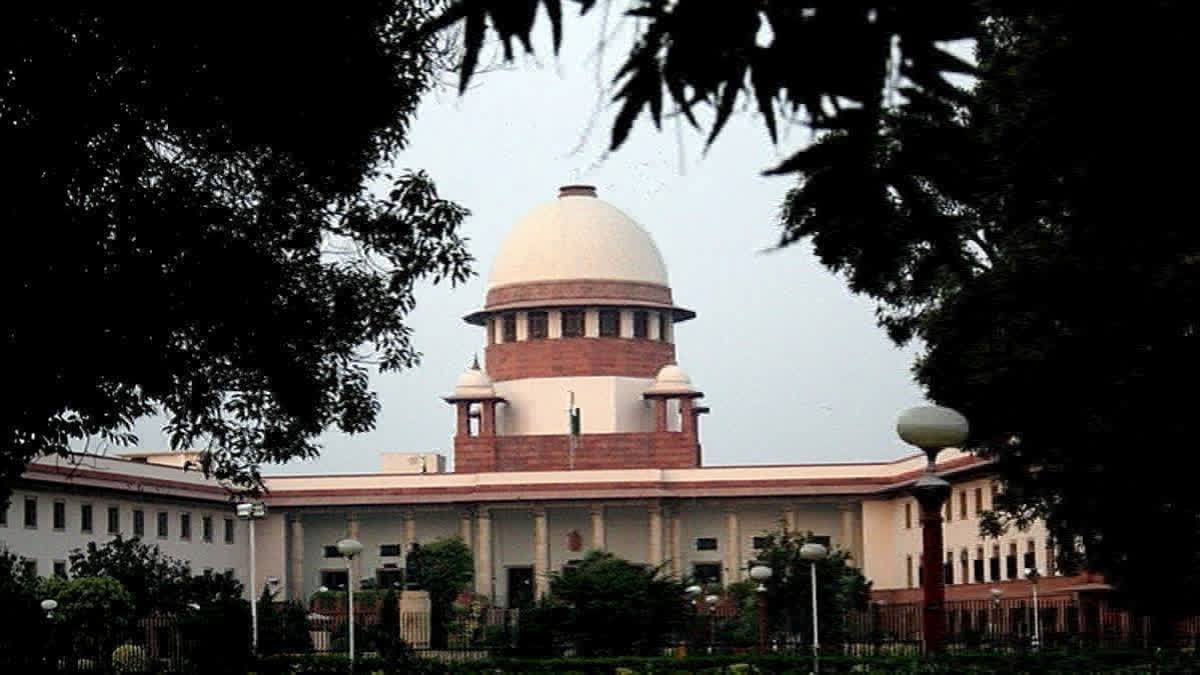New Delhi:The Supreme Court on Wednesday said toilets/washrooms/restrooms are not merely a matter of convenience, but a basic necessity which is a facet of human rights and emphasised that it is about basic rights and human dignity, while directing all states’ and high courts to ensure that separate toilet facilities are available for men, women, persons with disability and transgender persons in all courts and tribunals.
The apex court said the sorry state of affairs indicates the harsh reality that the judicial system has not entirely fulfilled its constitutional obligation to provide a safe, dignified, and equal environment for all those seeking justice.
A bench comprising Justices J B Pardiwala and R. Mahadevan said "Access to proper sanitation is recognised as a fundamental right under Article 21 of the Constitution, which guarantees the right to life and personal liberty. This right inherently includes ensuring a safe and hygienic environment for all individuals”.
The bench said courts should not be places where basic needs, such as sanitation, are overlooked and neglected, and the absence of adequate washroom facilities undermines equality and poses a barrier to the fair administration of justice.
Justice Mahadevan, who authored the judgment on behalf of the bench, said toilets/ washrooms/restrooms are not merely a matter of convenience, but a basic necessity which is a facet of human rights.
He said access to justice includes the creation of a pleasant and human atmosphere for all the stakeholders in the dispensation of justice. The bench said the litigants for fear of sitting in courts for long hours without access to basic amenities should not be forced to refrain from exercising their legal rights.
The bench stressed that public health is of paramount importance and clean public toilets contribute to the health and overall well-being of the society. The bench said availability of access to public toilets is an important duty of the states/UTs under the Directive Principles and without such access to the three genders, the states/UTs can no longer claim to be a welfare state.
The bench said the need for toilets is even more acute for judges/advocates/ litigants/staff members working in large number in the courts and tribunals as they are mostly struck in one place for longer periods because of the demands of the job and the system in the function of the courts/tribunals.
The bench observed that it could be discernible from the responses received that various high courts have not provided toilets for transgenders with only a few exceptions.
"There is no concrete statistical data regarding the availability of toilets for differently abled persons and separate toilets for lady judicial officers in their chambers situated within the court premises. Furthermore, there is a lack of transparency concerning the availability of funds and the timeline for construction of toilet facilities," said the bench, in the 34-page judgment.
The top court said district courts are in the worst and most deplorable conditions and failing to meet even basic hygiene standards. “As regards the District Courts, we must also point out our deep concerns that there are instances where even judges, particularly, in rural areas, still lack access to proper washroom facilities. This not only violates the rights of those directly affected but also tarnishes the reputation of the judicial system, which should serve as a model of fairness, dignity, and justice," said the bench.
The bench said the sorry state of affairs indicates the harsh reality that the judicial system has not entirely fulfilled its constitutional obligation to provide a safe, dignified, and equal environment for all those seeking justice.
The bench stressed on taking immediate steps to ensure that all judicial premises, especially those lacking proper facilities, are equipped with accessible washroom facilities for the judges, litigants, advocates, and staff. "It is re-emphasised that this is not just a matter of convenience but is about basic rights and human dignity. Failing to act promptly would compromise the very purpose and essence of the judiciary's role in our society," it observed.
The apex court issued a slew of directions in the larger public interest. "The High Courts and the State Governments/ UTs shall ensure the construction and availability of separate toilet facilities for males, females, PwD, and transgender persons in all Court premises and Tribunals across the Country," said the bench.
The bench said the high courts shall oversee and ensure that these facilities are clearly identifiable and accessible to Judges, advocates, litigants, and court staff. "A committee shall be constituted in each of the High Courts under the chairmanship of a Judge nominated by the Chief Justice and members comprising the Registrar General/Registrar of the High Court, the Chief Secretary, the PWD Secretary and the Finance Secretary of the State, a representative of the Bar Association and any other officers as they deem it fit, within a period of six weeks," said the bench.
The bench said state governments/UTs shall allocate sufficient funds for construction, maintenance and cleanliness of the toilet facilities within the court premises, which shall be periodically reviewed in consultation with the committee constituted by the high courts.
"A status report shall be filed by all the High Courts and the States/UTs within a period of four months," said the bench, adding that its registrar (judicial) is directed to circulate a copy of this judgment to the registrar general of all the high courts, and also to the chief secretaries of all the states/UTs, for strict compliance. The apex court has listed the matter after four months for reporting compliance.
The apex court’s judgment on a PIL filed by advocate Rajeeb Kalita seeking direction to all the states and UTs to ensure that basic toilet facilities are made available in all courts/ tribunals in the country for men, women and handicapped persons including transgenders, and to provide and maintain urinals and similar conveniences at appropriate locations in every Court premises as envisaged under Article 21 of the Constitution.
